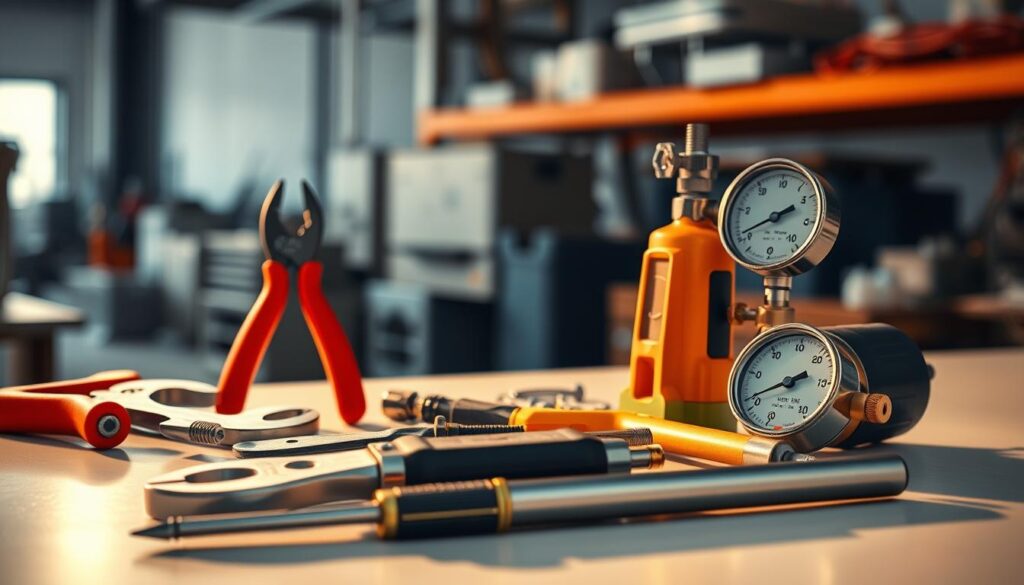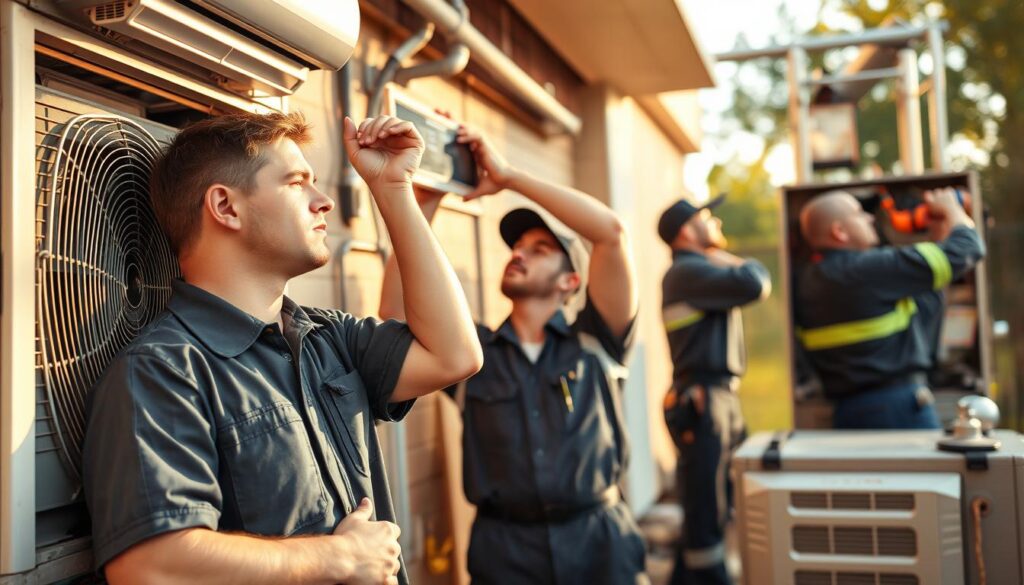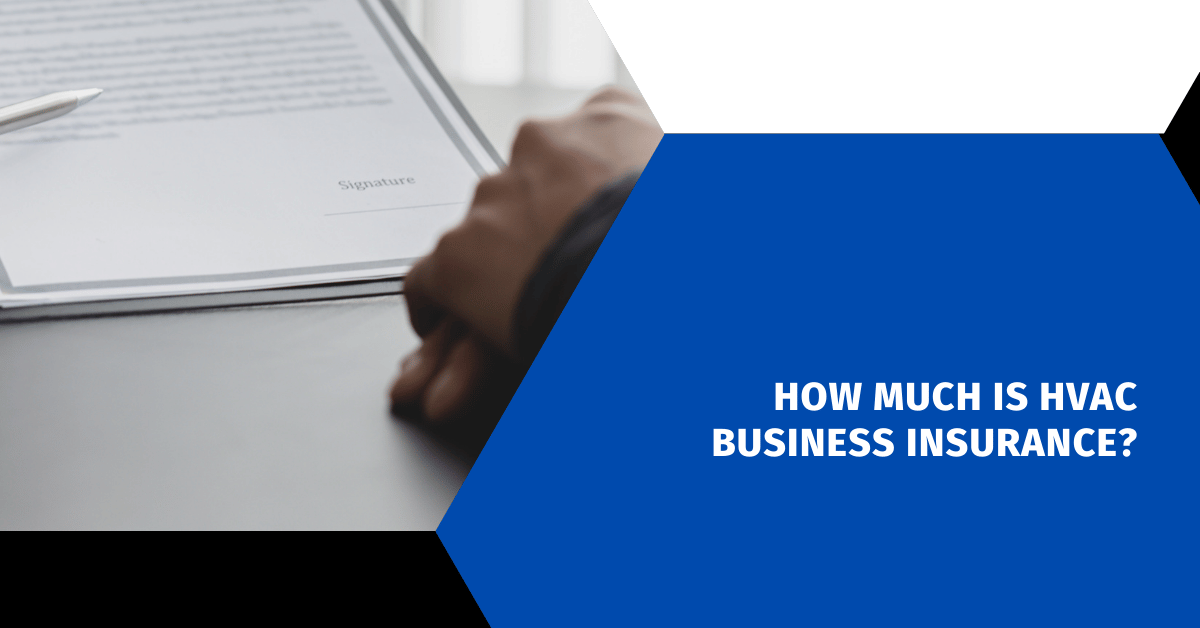Affiliate Disclosure
HVAC Guide Guys is a participant in the Amazon Services LLC Associates Program, an affiliate advertising program designed to provide a means for sites to earn advertising fees by advertising and linking to Amazon.
How Much Is HVAC Business Insurance? Ever thought about what keeps your HVAC business safe from big financial hits? Insurance might be the answer you didn’t know you needed. Knowing how much HVAC business insurance costs can help shield your company from unexpected risks and big financial problems.

HVAC business insurance is more than just another cost. It’s a key investment in your company’s future. Small and medium-sized HVAC contractors usually pay between $500 and $3,500 a year. This depends on your business size, services, and how risky your work is.
Getting accurate hvac business insurance quotes means looking closely at what your business needs. Every HVAC contractor faces different risks that affect how much insurance costs. So, getting coverage that fits your business is key to full protection.
Key Takeaways
- HVAC business insurance costs vary widely based on business specifics
- Annual insurance expenses can range from $500 to $3,500
- Customized coverage is essential for proper protection
- Insurance acts as a financial safety net for unexpected incidents
- Multiple factors influence insurance pricing
Table of Contents
Understanding HVAC Insurance Basics
Running an HVAC business comes with many risks. It’s important to know about hvac contractor insurance costs to protect your business. Insurance acts as a safety net for HVAC pros, covering them from liability and unexpected costs.
HVAC companies face unique risks that need good insurance. Your insurance costs can change based on several factors. But, getting the right coverage is a wise move for your business.
Types of HVAC Business Coverage
There are different insurance types for your HVAC business:
- Professional Liability Insurance
- Commercial General Liability Coverage
- Tools and Equipment Insurance
- Vehicle Insurance
- Workers’ Compensation
Who Needs HVAC Insurance Protection
Many HVAC professionals need insurance, including:
- HVAC Technicians
- Installation Specialists
- Maintenance Crews
- Business Owners
- Independent Contractors
Key Benefits of HVAC Insurance
Insurance does more than just protect your finances. It gives you peace of mind and shows you’re professional to clients. Your insurance can help you:
- Protect against unexpected legal claims
- Cover possible property damage
- Keep expensive equipment safe
- Keep your business running smoothly in tough times
By getting the right insurance, you can protect your HVAC business. This helps you avoid big financial risks.
Essential Coverage Components for HVAC Contractors
Protecting your HVAC business is key. You need insurance that covers many risks. Knowing what’s important in HVAC technician insurance helps you protect your business well.
Your HVAC business has special needs for insurance. The main parts of good insurance include:
- Professional Liability Insurance: Protects against claims of errors or negligence in your work
- Commercial General Liability: Covers third-party property damage and bodily injury
- Tools and Equipment Insurance: Safeguards your expensive HVAC machinery and tools
- Pollution Liability Insurance: Defends against environmental damage claims
HVAC liability insurance costs change based on your business needs. Each type of insurance covers different risks HVAC contractors face every day. For example, professional liability insurance helps if a client says your work damaged something or didn’t meet their expectations.
Comprehensive insurance isn’t an expense—it’s an investment in your business’s long-term stability and reputation.
Think about your services, equipment value, and risks in HVAC work when choosing insurance. A custom insurance plan can give you peace of mind and protect your finances from unexpected problems.
Explore Our HVAC Shop
Looking for top-rated HVAC tools, parts, and accessories? Visit our shop and find the perfect solution for your needs.
Visit the ShopHow Much Is HVAC Business Insurance?
Knowing the cost of HVAC business insurance is key for contractors. The price changes based on several factors. When you get quotes, you’ll see that size, services, and risks play a big role.
Small HVAC businesses pay differently than big ones. Your exact needs affect how much you’ll pay for full coverage.
Average Monthly Premium Costs
Most HVAC contractors pay:
- Basic coverage: About $60-$100 per month
- Comprehensive protection: $150-$300 per month
- Large businesses: Up to $500 monthly
Annual Insurance Expenses
For a whole year, expect to pay:
- Small businesses: $750-$1,500 annually
- Medium-sized operations: $2,000-$4,000 per year
- Large HVAC companies: $5,000-$10,000 annually
Coverage Limits and Their Impact
How much you pay depends on your coverage. More coverage means more protection but costs more. Common coverage levels are:
- General liability: $1 million to $2 million
- Property damage: $500,000 to $1 million
- Professional liability: $250,000 to $1 million
When looking for hvac business insurance quotes, think about what you really need. This helps you find the best deal.
Factors Affecting HVAC Insurance Rates
Understanding commercial hvac insurance rates can be complex. Many factors affect the cost of hvac service insurance for your business. Knowing these can help you manage and possibly lower your insurance costs.
Your business’s specific traits greatly influence insurance costs. Important factors that affect your rates include:
- Business Size and Operations
- Number of employees
- Annual revenue
- Types of HVAC services provided
- Geographic Location
- Local risk environment
- Regional weather patterns
- Local regulatory requirements
- Claims History
- Past insurance claims
- Frequency of incidents
- Severity of previous claims
Your professional experience greatly affects commercial hvac insurance rates. Insurers look at your business’s safety record, safety protocols, and risk management. Businesses with good safety training, few claims, and lots of experience usually get better hvac service insurance prices.
Coverage limits and deductibles also impact your insurance costs. Higher deductibles mean lower monthly premiums, but more coverage means higher costs. Finding the right balance between protection and cost is essential for managing your insurance investment.
Professional Liability and General Liability Coverage
Understanding liability insurance is key to protecting your HVAC business. Professional and general liability coverage are essential. They help shield your business from unexpected financial risks.
Understanding Professional Liability Claims
Professional liability insurance protects your HVAC business from claims of professional mistakes or negligence. It helps cover lawsuits from:
- Incorrect system installations
- Faulty diagnostic recommendations
- Design errors in HVAC systems
- Missed critical maintenance issues
“In the HVAC industry, one professional mistake can lead to significant financial consequences.” – Industry Risk Management Expert
General Liability Protection Scope
General liability coverage goes beyond professional errors. It covers third-party property damage and bodily injury. HVAC liability insurance premiums include protection for:
- Customer property damage during repairs
- Accidental injuries at work sites
- Potential legal defense costs
Coverage Limitations and Exclusions
These insurance plans have limits and exclusions. Knowing what’s not covered is important. Some common exclusions include:
- Intentional damage
- Contractual liability beyond standard agreements
- Pollution-related incidents
- Employee injuries (covered by workers’ compensation)
Reviewing your hvac repair insurance plans is vital. It ensures you have the right protection for your business.
Explore Our HVAC Shop
Looking for top-rated HVAC tools, parts, and accessories? Visit our shop and find the perfect solution for your needs.
Visit the ShopEquipment and Tools Insurance for HVAC Businesses

Keeping your valuable assets safe is key for any HVAC business. HVAC installer insurance covers the tools and equipment you need every day. These plans protect your most critical business assets.
Insurers look at the value of your tools and equipment differently:
- Tools: Items worth less than $1,500
- Equipment: More expensive items worth over $1,500
Your HVAC business needs special tools and equipment to do the job right. Insurance helps shield you from sudden financial hits due to:
- Theft of expensive diagnostic tools
- Damage to essential HVAC installation tools
- Accidental damage to valuable machinery
The price of your insurance depends on a few important things:
- The total value of your tools and equipment
- How many items you need to insure
- The types of risks your business faces
Getting full equipment insurance is not just a cost. It’s a vital shield for your HVAC business’s financial health.
Protect your business assets with the right hvac installer insurance policies. Good hvac technician insurance coverage lets you quickly fix or replace key tools and equipment. This cuts down on downtime and keeps your revenue flowing.
Commercial Auto Insurance Requirements
Your HVAC business’s vehicles are key assets that need full protection. Commercial auto insurance is vital for your business. It helps protect against financial losses from vehicle-related incidents.
Knowing the right commercial hvac insurance rates is important. Your business fleet has unique needs. Your vehicles are not just for transport. They carry expensive equipment and show your brand on the road.
Vehicle Coverage Options
For HVAC contractors, vehicle insurance offers several key protections:
- Collision coverage for vehicle damage
- Comprehensive protection against theft or vandalism
- Liability coverage for third-party property damage
- Uninsured/underinsured motorist protection
Fleet Insurance Considerations
Managing multiple vehicles affects your commercial hvac insurance rates. Considerations include:
- Total number of vehicles in your fleet
- Vehicle age and condition
- Driving records of employees
- Annual mileage
Pro tip: Bundling your fleet insurance can often reduce overall hvac company insurance expenses and provide more coverage.
Explore Our HVAC Shop
Looking for top-rated HVAC tools, parts, and accessories? Visit our shop and find the perfect solution for your needs.
Visit the ShopWorkers’ Compensation and Employee Coverage

Workers’ compensation is key for hvac contractor insurance costs. It protects employees and business owners. As an HVAC business owner, knowing about hvac technician insurance for workplace injuries is vital. It keeps your business safe and financially sound.
Workers’ compensation insurance is designed to protect your team. HVAC technicians face risks on the job, like working on rooftops or in tight spaces. This increases the chance of injuries.
- Covers medical expenses for work-related injuries
- Provides wage replacement during recovery
- Protects employers from lawsuits
- Ensures compliance with state laws
Calculating workers’ compensation premiums involves several factors:
- Total payroll amount
- Job classification risk levels
- Previous workplace injury history
- Safety training programs
Pro tip: Investing in safety training can lower your hvac contractor insurance costs. It shows you’re proactive in managing risks to insurance providers.
Protecting your employees is not just a legal requirement. It’s a key responsibility of being a responsible business owner.
By focusing on workers’ compensation, you create a safe space for your HVAC technicians. This also protects your business’s financial health.
Conclusion
Knowing how much HVAC business insurance costs is key to protecting your business. Your insurance plan should fit your business like a glove, covering all bases without breaking the bank. The right policy protects your business from unexpected problems while keeping costs down.
When looking for HVAC business insurance quotes, remember each policy is tailored to your business. Things like how big your business is, where you operate, and what equipment you have affect your needs. Investing in good insurance can save you from big financial hits from accidents or claims.
It’s important to review your insurance policy regularly as your business grows. What was right for you last year might not be enough now. Stay ahead by checking your coverage every year, comparing quotes, and updating your policy as needed. This way, you avoid paying too much or not enough for your insurance.
Your insurance is more than a must-have—it’s a smart business move. By understanding your options, assessing risks, and making smart choices, you build a strong foundation for your HVAC business. This will help your business grow and succeed in the long run.
FAQ
How much does HVAC business insurance typically cost?
How much does HVAC business insurance typically cost?
FAQ
How much does HVAC business insurance typically cost?
HVAC business insurance costs vary. They can be from 0 to ,000 a year. This depends on your business size, coverage needs, and risks. Small businesses might pay 0-
FAQ
How much does HVAC business insurance typically cost?
HVAC business insurance costs vary. They can be from $500 to $5,000 a year. This depends on your business size, coverage needs, and risks. Small businesses might pay $700-$1,500 yearly. Larger companies could pay $2,000-$5,000 annually.
What types of insurance do HVAC contractors need?
HVAC contractors need several types of insurance. These include general liability, professional liability, and commercial property insurance. They also need coverage for tools and equipment, commercial auto insurance, and workers’ compensation insurance.
Does the size of my HVAC business affect insurance costs?
Yes, your business size affects insurance rates. The number of employees, annual revenue, vehicles, and equipment value all play a role. Larger businesses with more assets and employees pay more.
What does professional liability insurance cover for HVAC contractors?
Professional liability insurance covers mistakes, errors, or negligence in your services. This includes incorrect installations, design errors, or performance issues that cause financial losses for clients.
How can I reduce my HVAC business insurance costs?
To lower insurance costs, keep a clean claims history and implement strong safety protocols. Provide regular employee training and bundle insurance policies. Increase deductibles and shop around for better quotes.
Is workers’ compensation insurance mandatory for HVAC businesses?
In most states, workers’ compensation insurance is required for businesses with employees. The rules vary by state. But, most HVAC businesses with employees must have this insurance to protect workers from job-related injuries or illnesses.
What does commercial auto insurance cover for HVAC businesses?
Commercial auto insurance covers business vehicles, like work trucks and vans. It includes damage, liability for accidents, medical expenses, and coverage for tools and equipment in the vehicle.
How often should I review my HVAC business insurance coverage?
Review your insurance coverage annually or when your business changes. This includes hiring new employees, buying new equipment, expanding services, or changing locations.
What is pollution liability insurance for HVAC contractors?
Pollution liability insurance covers environmental damage during HVAC installations or repairs. This includes refrigerant leaks, improper disposal, or accidental contamination.
Do I need insurance if I’m a solo HVAC technician?
Yes, solo contractors need insurance. Many clients require proof of insurance before hiring. It also protects you from financial risks like accidents, property damage, or professional errors.
,500 yearly. Larger companies could pay ,000-,000 annually.
What types of insurance do HVAC contractors need?
HVAC contractors need several types of insurance. These include general liability, professional liability, and commercial property insurance. They also need coverage for tools and equipment, commercial auto insurance, and workers’ compensation insurance.
Does the size of my HVAC business affect insurance costs?
Yes, your business size affects insurance rates. The number of employees, annual revenue, vehicles, and equipment value all play a role. Larger businesses with more assets and employees pay more.
What does professional liability insurance cover for HVAC contractors?
Professional liability insurance covers mistakes, errors, or negligence in your services. This includes incorrect installations, design errors, or performance issues that cause financial losses for clients.
How can I reduce my HVAC business insurance costs?
To lower insurance costs, keep a clean claims history and implement strong safety protocols. Provide regular employee training and bundle insurance policies. Increase deductibles and shop around for better quotes.
Is workers’ compensation insurance mandatory for HVAC businesses?
In most states, workers’ compensation insurance is required for businesses with employees. The rules vary by state. But, most HVAC businesses with employees must have this insurance to protect workers from job-related injuries or illnesses.
What does commercial auto insurance cover for HVAC businesses?
Commercial auto insurance covers business vehicles, like work trucks and vans. It includes damage, liability for accidents, medical expenses, and coverage for tools and equipment in the vehicle.
How often should I review my HVAC business insurance coverage?
Review your insurance coverage annually or when your business changes. This includes hiring new employees, buying new equipment, expanding services, or changing locations.
What is pollution liability insurance for HVAC contractors?
Pollution liability insurance covers environmental damage during HVAC installations or repairs. This includes refrigerant leaks, improper disposal, or accidental contamination.
Do I need insurance if I’m a solo HVAC technician?
Yes, solo contractors need insurance. Many clients require proof of insurance before hiring. It also protects you from financial risks like accidents, property damage, or professional errors.

